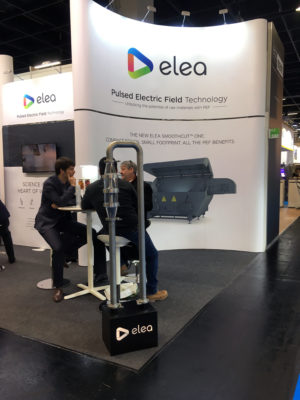Pulsed Electric Field (PEF) technology offers great potential for juice makers
Imagine there was technology that would allow you to get more juice out of a batch of apples. Imagine that same technology could extend shelf life, improve food safety and preserve taste, appearance and nutritional value.
Well, there is.
For its ability to improve food safety and quality — as well as the competitiveness of food companies — Pulsed Electric Field (PEF) technology is being hailed a revolution in food processing. Produce Processing learned more about the technology at the most recent Anuga FoodTec trade show in Cologne, Germany.
How PEF technology works
The revolutionary technology uses short, high-voltage electrical pulses to perforate cell membranes. The process is called electroporation and it makes cell membranes more permeable. Not only does PEF enhance extraction of intracellular compounds from plant-based foods, but it also inactivates microorganisms. Because it kills microbes at lower temperatures than conventional heating, it keeps vitamins, antioxidants and pigments intact.
PEF also increases shelf life, a desirable benefit in this waste-conscious era, and is especially advantageous to processors who work with heat sensitive foods.
Europe invests in PEF
Until now, high investment costs have kept smaller processing companies from benefiting from technology like PEF. Knowing that it offered significant benefit to small-scale processors, though, European Union leaders decided to fund a project to test and invest in the technology. The project, called FieldFOOD, was funded by a grant from the EU’s Horizon 20/20 research and innovation program. It was a partnership between several entities, including the University of Zaragoza, the European Federation of Food Science and Technology (EFFoST), Energy Pulse Systems and the Research Centre for Energy Resources and Consumption (CIRCE).
The three-year project began in April 2015 and is now complete. Its goal was to develop flexible, low-cost PEF technology for small-scale processors.
“The big companies are focused on the big processing companies,” said Linda Scholten, communications official for EFFoST.
FieldFOOD PEF technology, however, is low-cost, flexible and can be integrated in any existing processing line, she said.
“This makes it so much more interesting for small- and medium-sized companies that wouldn’t be able to afford one of the other technologies,” she said. “The reason why they decided to invest in this technology is because PEF actually works.”
Fruit juice processors may notice PEF’s ability to improve yield extraction, extend shelf life and improve safety of non-pasteurized juices. In juices, PEF technology helps maintain taste, appearance and nutritional value, a huge selling point for fresh juice processors, said Scholten.
Tomato processors will be equally impressed by how much energy can be saved during peeling. “Once a tomato is PEFed, you can actually remove the skin of the tomato so much easier,” Scholten said. PEF also increases lycopene bioavailability in tomatoes.
Focus on small-scale lines
PEF technology was designed specifically for food applications, said Marcos Pereira, board member and partner at Energy Pulse Systems. Non-thermal food processing for extended shelf life of fruit juices is one of the main applications.
 “Our value proposition is focused on small-scale processing lines of up to 500 liters per hour where the equipment may be shared by several small juice producers that value the natural products and seek an increase in shelf life, but keeping the freshness of the juice,” Pereira said. “The €80,000-investment (about $90,800) is an outcome of the European FieldFood project that was recently terminated after three years of a multi-million euro projects involving 10 institutions and companies in the European food sector.”
“Our value proposition is focused on small-scale processing lines of up to 500 liters per hour where the equipment may be shared by several small juice producers that value the natural products and seek an increase in shelf life, but keeping the freshness of the juice,” Pereira said. “The €80,000-investment (about $90,800) is an outcome of the European FieldFood project that was recently terminated after three years of a multi-million euro projects involving 10 institutions and companies in the European food sector.”
The EPULSUS developed for PEF is sold on the global market. So far Pereira said they’ve sold equipment to labs in U.S., France, Germany, Spain, Chile and Mexico.
“Our equipment is made with state-of-the-art, off-the-shelf components, bringing advanced pulsed power electronics to SMEs in the food sector at an economic cost,” Pereira said. “These state-of-the-art components are being used in the equipment developed and sold in international physics labs and biotech companies in the U.S.”
Energy Pulse Systems isn’t the only company offering pulsed electric field technology. German company Elea offers a range of PEF technology, including SmoothCut, CoolJuice and PEFPilot. The company believes PEF is the future when it comes to processing raw product.
“As PEF is applicable to all products where quality counts it will become the preferred industry technology,” said Stefan Töpfl, professor at the German Institute of Food Technology and part of the team that built Elea. “PEF can restructure raw materials, improve cutting, increase yield, enhance product quality, extend shelf life and enable new product development. One targeted treatment brings great value to your business.”
To learn more about the FieldFood project, PEF technology, visit www.fieldfood.eu.
— By Melanie Epp, contributing writer







